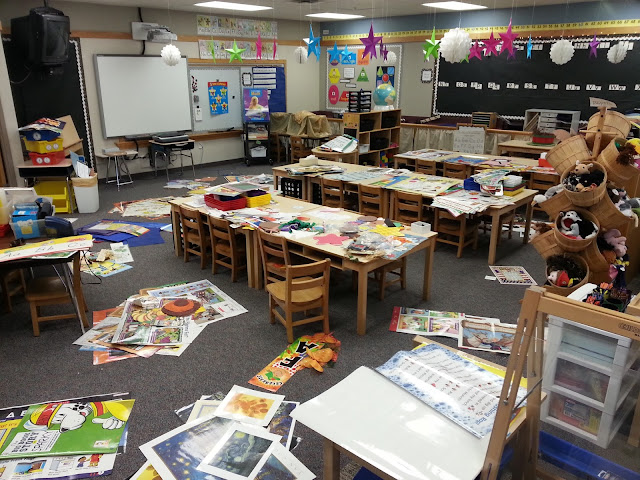Librarians are Parents, Too
My Black-Friday reading this morning included Deborah Caldwell-Stone's opinion statement in the Miami Herald, "Parents should not be able to dictate what other parents’ children can read." She closes "Rather than teaching lessons in censorship, librarians and library workers strive to affirm the importance of the freedom to read and to demonstrate to young people that in this country they have the right and responsibility to think critically about what they read, rather than allowing others to do their thinking for them."
The last informal book challenge in my school district of which I'm aware occurred four or five years ago, and involved a title that is included in classroom book tubs that support our kindergarten and first-grade ELA curriculum. Prior to that challenge which took place under the radar, I only know of one other that made it through what was then the district's reconsideration policy procedures, Eric Carle's Draw Me a Star. I've found no current policy to which to refer should any parents complain about titles housed in the district's libraries, which has me wondering as a first-year library media specialist if I should be concerned in light of the censorship fervor that parents and political groups are finding so satisfying yet again.
I'm also questioning if my own perception of these parents will be easy to navigate around in order to diplomatically support readers. Encountering an increase in stories and posts regarding book challenges, I'm having to remind myself for the sake of balance that for every parent who wants to dictate the contents of school libraries there are many more who recognize the need for diverse titles and support students' right to read, even if they request that certain books remain unchecked by their own children until they reach a certain age. They simply ask on behalf of their own families, not everyone else's.
I suspect that some parents who want to censor and ban books for all children do so not because they believe that a book "has the power" to magically turn someone into another gender, gay, a theist of any kind, or even the world's greatest barbecue chef, but because they fear that any depiction in a book that appears in opposition to their own life's example may foster the growth of the simple questions that every child (no matter what) eventually asks regarding the adults around them: are they right? Is what they think right for me?
Fragile, fearful egos are the root of this particular parental "concern," and I get it. To be judged by one's own children, even suspecting they're regularly evaluating your daily actions or your entire life can give you pause. Parents say they fear the ideas that authors "sneak" into books and then illogically draw attention to the thing that will likely make their children more, rather than less intrigued with it. Parading themselves in front of school boards, bellowing or shrieking into microphones, and threatening librarians because they're angry to have had a tough discussion with their child is their response to fear not terribly well masked as bravado. I don't consider them formidable, I consider them fearful. And I can be judgy with that perception of adults who are old enough to know better. I'm working on it.
Perhaps they've never taken the time to figure out, or been brave and inclusive enough to conclude "Honey, I can't agree or disagree with what the author says because I'm not ________ or ____________ or _____________. Do you want to learn more about what he/she/they have said, or would you rather read something else?" This simple statement would acknowledge a young reader's feelings. It would demonstrate that parents are aware there are some differing and difficult points of view that will be encountered. It shows that trusted adults can respond thoughtfully rather than theatrically. And I suspect that it could help parents to be judged by their children as something other than hypocritical, insecure, and fearful, especially when those kids discover logic itself. After all, if a book can "turn" you into something, then another book can simply undo the change afterward, so why fear books?
As a parent, I don't feel my life only has value if my children are my clones. If homogeneity was the goal for humanity, I have failed spectacularly, and am very proud to have done so. I also haven't policed my kids' libraries while ignoring all other forms and sources of media and information because I don't need a convenient target for any fear-inspired rage. My children can develop into themselves through their own balancing of curiosity and familial and societal truths, even if I've found my role as a parent difficult at times.



Comments
Post a Comment